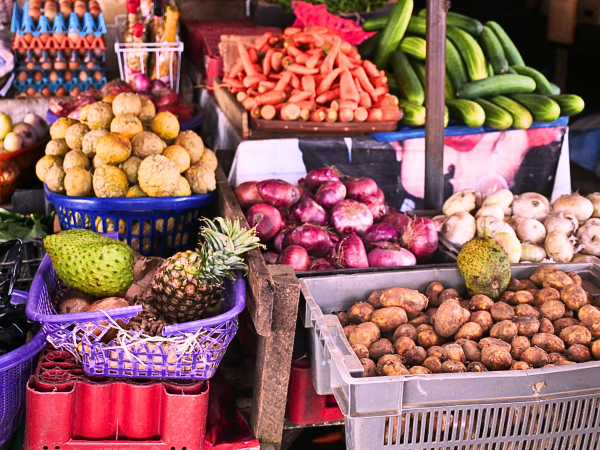Sustainable Development Goal 2 is to seek solutions to end hunger and abject poverty in all forms by 2030, whose aim is to ensure that everyone everywhere, especially developing countries, has enough access to good-quality food for healthy living.
But then, the recurrence situation marked by environmental sustainability challenges and the instability of government institutions has heightened the issue of food security, which works towards achieving zero hunger as highlighted in the Sustainable Development Goals.
According to the 2022 Global Report on Food Crises 2022 Mid-Year Update, at least one in five Africans goes to bed hungry, and an estimated 140 million people in Africa face acute food insecurity. At this point, Sub-Saharan Africans are feeling the heat from the impacts of climate change, a hike in fuel prices, the crisis exacerbated by the Ukraine war, soaring inflation, rising debt, and extreme weather conditions, as well as Nigeria, which is heavily affected.
In September, the National Bureau of Statistics (NBS) reported that Nigeria's annual inflation rate rose to 26.72 percent from 25.80 percent in the previous month.
According to the report, the food inflation rate in September quickened to 30.64 percent on a year-on-year basis, which was 7.30 percent higher compared to the rate recorded in September 2022 (23.34 percent).
This shows that the Nigerian economy has grappled with a series of complex challenges, with the price of food continuing to rise year by year. Hunger and poverty increase at their own pace as a result of government policies such as subsidy removal, among others.
Recently, the Central Bank of Nigeria (CBN) announced that it had lifted the restriction on the 43 items prohibited in 2015 from accessing foreign exchange (FX) from the official foreign exchange windows. The apex bank added that it was part of the Nigerian government’s efforts to improve liquidity and stability in the market and attract foreign investors into the Nigerian economy.
As much as the policy has been appreciated and welcomed by many for international exchange and relationships, economic experts still believe that it has created strong pressure and competition among local currency and manufacturers, with a triple effect on the domestic market.
This intriguing situation of global economic forces and domestic policy has impacted greatly on the country’s food security landscape as Nigerian citizens struggle over the intensified high cost of food, which poses a threat to the well-being of the people,especially women and children.
Speaking on the lingering issue, Chris Ugo, the Chief Executive Officer of Cee Global Supplies Limited, revealed that the Forex policy did not directly affect the increased price of food produce; rather, it affected resources used in the transportation of this produce.
In his words, “the Forex policy has an effect on diesel, which is the core source for trucks; the cost of diesel has tripled, and materials used for the production of plastic crates have skyrocketed because production materials are imported. Plastic crates and diesel are the core factors that support the transportation of this product. So it can be said that it increases the cost of vegetables indirectly”.
“If this issue is not properly addressed, hunger and diseases may linger as farmers in the North will not have enough resources to transport their vegetables, which could result in waste and losses. This is a pandemic that needs the urgent attention of the government; if not, the dietary composition of food for children in poor households will be limited, he added.
Chris further appealed to the government and development communities to provide local subsidies for farmers for the distribution of food across the country.
Also, Ashia Rufiat, a widow and mother of five children who makes ends meet from a very small kiosk shop, narrates that since the price hike, she can no longer cater for her children.
"Every day, the prices of food keep increasing to the point that I cannot restock my shop. It happens like magic: you purchase a goods today, and the next day, it rises to 100% of the previous price. I can no longer continue my business; eating is a problem for me and my children. We cannot boost a complete square meal with nutritional value; in fact, tomatoes are for the rich, and the poor like me cannot afford them. Look at my children; they are fading away gradually. Not only me, but a lot of people of my status are experiencing this same issue, she lamented.
The rapid increase in prices of commodities and other staple foods has had a negative impact on the purchasing power of many citizens, making it difficult for many households in the country to afford daily meals. The forex has drastically depreciated the local currency and the entire supply chain through the inflation of the prices of goods and services.
It has also disrupted the livelihoods of smallholder farmers, who are the core producers of food in Nigeria; therefore, increasing costs of farming such as fertilizers, seeds, machinery, and transportation have rendered farming financially unviable, reducing the overall agricultural output and worsening the food scarcity crisis.
To eradicate the food crisis at this time, the Nigerian government must channel its policy toward ways to improve agricultural production, invest in agricultural infrastructure and technology, reduce absolute dependence on the importation of farm produce, promote local industries, provide innovative solutions for food storage, and provide financial support for local farmers.
Furthermore, fostering strategic partnerships with international development organizations for knowledge sharing, technology transfer, and trade collaboration can aid in building a resilient food security network and subsidizing cold logistic companies for easy, safe transportation and distribution of perishable products.

